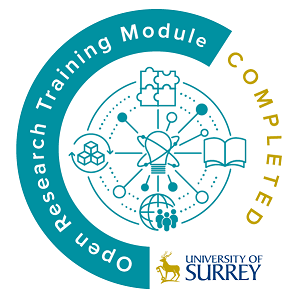In my previous post, I talked about research culture here at Surrey and touched on the topic of open research. Since this is such a broad and important topic, I wanted to dedicate a whole post to open research to showcase the ways that Surrey encourages open research within our research community.
The University’s stance on open research
Surrey has a long-standing commitment to open research and has had an open access policy since 2005. The current Research and Innovation Strategy states that:
“We believe that openness is at the heart of a strong scholarly research culture, as a mechanism to increase reproducibility, to lower barriers to accessing knowledge, and to build upon each other’s work. At Surrey, in accordance with the Concordat on Open Research Data, we will continue to promote and support open and immediate access to publications, research data, and other research outputs.
Our open research aspirations extend beyond access, to how we do research and to how we disseminate our findings. We will adopt open platforms and services, participate in open, collaborative projects, and engage with the public to achieve the ultimate objective of advancing knowledge and creating innovation for the benefit of all.”
Part of the University’s open access policy is its Open Research repository where papers published by Surrey researchers are available for anyone to read. For more information about the University’s stance on open research, you can read the statement on open research here and check out the open research web page here which is full of information and advice for those wanting to learn more about open research.
Open research tools and initiatives
There are so many ways that you can engage with open research at Surrey. Here’s a summary of the things I’ve used and been involved with as a postgraduate researcher.
The Surrey Open Researcher Community
I joined the open researcher teams channel last year and it’s my go-to place for getting information on the latest open research events and news. There’s a discussion channel and lots of useful resources like a folder full of literature on open research that you can read in your own time. Events like the Open Research Lecture and events around the UK on open research are also often advertised through this teams channel.
Surrey Reproducibility Society

The Reproducibility Society is a student society that focuses on open research culture. Inspired by the UK Reproducibility Network, it aims to encourage research students to discuss open and reproducible research methods. It’s great to get involved with the activities of this society which include mini hacks (coding workshops) and ReproducibiliTea journal clubs. If you want to learn more about open research and connect with other research students who are interested in the topic, this is the place to go!
Open Research in Practice module
The Open Research in Practice module was developed by the open research team and the library as a resource for researchers at Surrey. You can access the module through SurreyLearn and it takes you through various aspects of open research practices for you to consider. At the end of the module, you’ll create an open research plan that you can implement and use as a tool for guiding how you conduct your research.

I found the module really helpful as an introduction to open research as it covers a broad range of topics such as context and definitions, open access, open data, open licenses, identifiers, metadata, dissemination, reproducibility, transparency, open source, citizen science, and open education. At the end of the module, you get a digital badge to show that you completed the module and made your open research plan. Looking back, this module gave me the impetus to engage in open research practices myself rather than just learning about open research.
The Open Research Lecture
I participated in the inaugural Open Research Lecture in April this year. It was a great event with keynote speaker Dr Karen Salt who talked to us about “Open and Transparent Research Culture”. The event also included a poster session and a panel discussion on “Incentivising Open Research across all disciplines”. It was at this event that I really felt like I was part of an open research community as everyone attending was interested in the topic and exchanged lots of ideas, particularly during the poster session.

The posters were either on the researcher’s plans for open research or completed studies. I did a retrospective poster that discussed open research practices I’d learned about, what I’ve done already and what I plan to do in the future. This was heavily influenced by the open research plan I made following the training module. I was interested in exploring why open research is such a hurdle for many people, particularly in my field of quantum technology, and took this as an opportunity to create a piece of reflective work which is something I’ve never done before in an academic context! I really enjoyed looking at other people’s posters to see what they were thinking about and trying out in their own research practices.
The Open Research Handbook
The Open Research Handbook is a convenient summary of all the resources available at Surrey. I often refer to it when there’s a specific open research topic I want to explore in more detail, and it makes for a nice companion to the Open Research in Practice module. So when I wanted to learn more about data management and publishing my data in an open repository, this was where I went to get more information about how I go about doing this.
So what can you do as a postgraduate researcher?
If you want to take action towards open research as a PGR, you could:
- Join communities and groups like the reproducibility society
- Get involved with events like the open research lecture
- Speak to your supervisor about publishing open access
- Complete the Open Research in Practice module and create an open research plan
- Talk to your peers about open research
- Look into open research practices such as data repositories, registered reports, and open research notebooks
- Join the conversation on Twitter through hashtags like #OpenResearch
